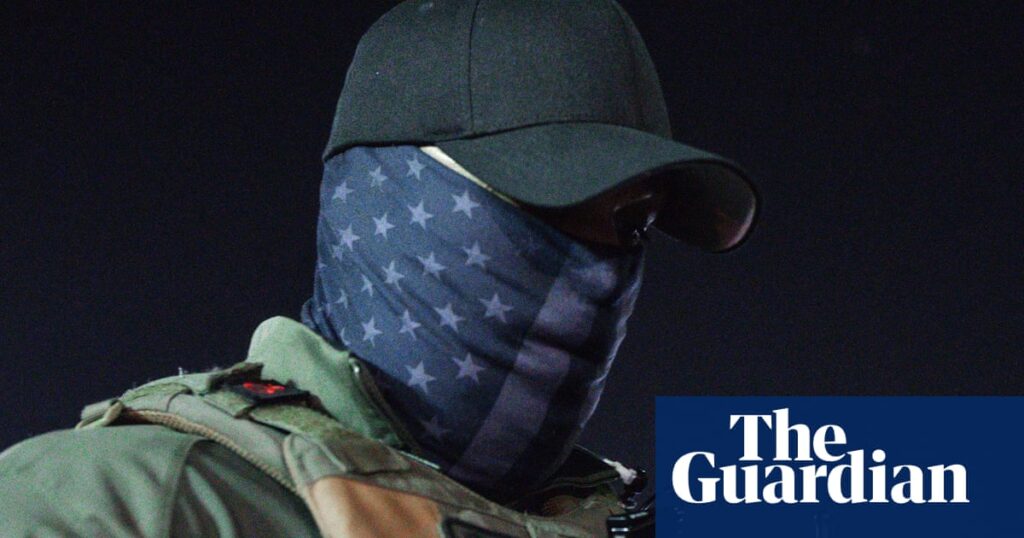
In recent months, a troubling trend has emerged across the United States: federal immigration officers increasingly concealing their identities during operations. Whether donning balaclavas, neck gaiters, or casual clothes, these officers are conducting immigration raids and arresting protesters while remaining anonymous. This practice has raised alarms among civil rights advocates and law enforcement experts who warn of its potential to undermine democratic principles.
Mike German, a former FBI agent and fellow at the Brennan Center for Justice, describes the widespread use of masks by officers as unprecedented in American law enforcement history. “Masking symbolizes the drift of law enforcement away from democratic controls,” he stated, emphasizing the erosion of trust this practice could foster. The Department of Homeland Security (DHS) defends the use of masks, citing officer privacy and an alleged increase in violence against agents, though evidence supporting these claims remains elusive.
Historical Context and Expert Opinions
The use of masks by law enforcement is not without historical precedent, but it is typically associated with police states rather than democratic societies. German, who previously infiltrated white supremacist groups, notes that the current trend represents a significant departure from established norms. “Our country is known for having democratic control over law enforcement,” he remarked. “When it’s hard to tell who a masked individual is working for, it’s hard to accept that that is a legitimate use of authority.”
“When real agents use masks more frequently, it becomes easier for imposters to operate.” — Mike German
German’s concerns are echoed by other experts who fear that the anonymity granted by masks could facilitate illegal activities by imposters posing as officers. The implications for public safety are profound, as citizens may struggle to discern legitimate law enforcement actions from criminal impersonations.
Post-9/11 Policing Trends
The increased use of masks can be seen as part of a broader trend in American policing that began after the September 11 attacks. The introduction of the Patriot Act and expansions to the Foreign Intelligence Surveillance Act granted law enforcement agencies significant new powers, including mass warrantless surveillance. These changes, according to German, rolled back reforms designed to prevent abuses and have led to a culture of excessive secrecy.
“Once police think of themselves as domestic intelligence agents rather than law enforcement sworn to protect the public, it creates this attitude that the public doesn’t have a right to know what they’re doing,” German explained. This mindset, he argues, has now extended to the concealment of officers’ identities during public operations.
Legislative and Leadership Challenges
Efforts to address the issue through legislation are underway, with some Democratic senators urging Immigration and Customs Enforcement (ICE) to mandate agent identification. In California, state lawmakers have proposed banning law enforcement from masking while on duty, arguing that public servants should not operate like “Star Wars stormtroopers.”
However, German stresses that effective change requires more than just new laws. “Having clear laws, regulations, and policies that require law enforcement to operate in an accountable fashion is critical,” he said. “But a lot of this is about leadership.” He highlights the need for law enforcement leaders to prioritize professionalism and accountability, rather than justifying masking as a security measure.
Implications for Public Trust and Safety
The potential consequences of this trend are significant, both for public trust and safety. Recent incidents, such as the shootings of two Democratic lawmakers in Minnesota by a suspect impersonating an officer, underscore the dangers posed by masked law enforcement. The anonymity provided by masks could embolden criminals to disguise themselves as officers, increasing the risk of public harm.
“Federal agents wearing masks and casual clothing significantly increases this risk of any citizen dressing up in a way that fools the public into believing they are law enforcement.” — Mike German
As the debate continues, the challenge remains to balance officer safety with the public’s right to transparency and accountability. Without clear identification, the legitimacy of law enforcement actions can be called into question, potentially leading to increased resistance and conflict during operations.
As lawmakers and law enforcement agencies grapple with these issues, the importance of maintaining public trust in policing practices cannot be overstated. Ensuring that officers are identifiable and accountable is essential to upholding the democratic values that underpin the justice system in the United States.







